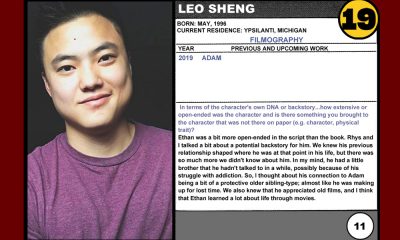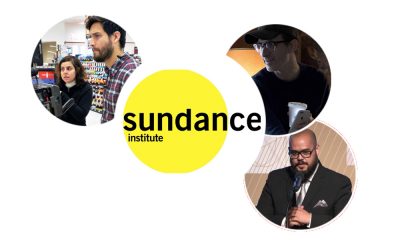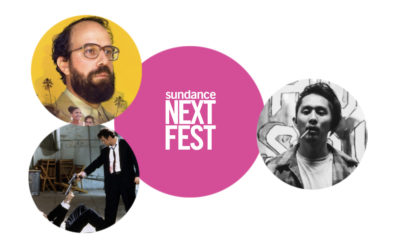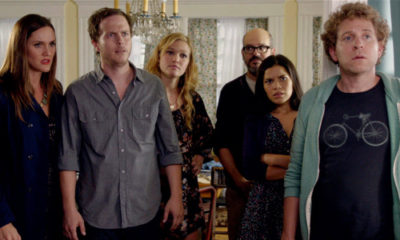Retro IONCINEMA.com
Interview: Goran Hugo Olsson (The Black Power Mixtape: 1967-1975)
“So as a filmmaker, you’re looking for topics and subjects that you think would be a good film, but also a topic that you are engaged in, so you can dedicate two or three years of your life to it.”
The Black Power Mixtape: 1967-1975 is a fine example of a documentary that blends the past and present, using the visual medium of film as a “mixtape” to collect images of the Black Power movement of the 1960s and 1970s while being entirely narrated from new and archived interviews with activists such as Angela Davis, Stokely Carmichael, and Kathleen Cleaver, and musicians such as Erykah Badu, Talib Kweli, and Questlove. The film’s footage was filmed by Swedish filmmakers who made documentary segments for Swedish television of the black power movement, and chronicling how a cycle of poverty, structural racism, and the need for equality using intellectual thought was pertinent during these years. These issues were spearheaded by the Black Panthers who, contrary to popular belief, were not advocating for violence but for education and reform in the black community.
The film was directed by Göran Hugo Olsson, who had previously directed Am I Black Enough For You (2009), about the life of Billy Paul, the sound of Philadelphia soul music, and the relationship between Paul and his wife, Blanche. The Black Power Mixtape was at Sundance in the World Cinema Documentary Competition category, and just played at New Directors/New Films. I spoke with Olsson this March in NYC.
Melissa Silvestri: How did you get involved with putting together this film and its footage?
Göran Hugo Olsson: I was doing research for another film. I decided that film should take place only in nighttime, so I wanted to have night shots of America from the 60’s and 70’s, and in the archive, I started looking for those images, and I also found this, the material that makes up the mixtape. It was only broadcast once in primetime, and never again. So as a filmmaker, you’re looking for topics and subjects that you think would be a good film, but also a topic that you are engaged in, so you can dedicate two or three years of your life to it. So when I discovered this much material, I realized this is a good film, this is something I want to do. So was my duty to take these images from the basement to a wider audience.

Silvestri: Were the subjects interviewed particularly for this film or were their interviews taken from other sources?
Olsson: Archived films, they can get claustrophobic, in a sense, because however good the images are or how interesting, you’re confined in the space of the archives. So I wanted to add voices from today, more oxygen into it. I needed voices and information that put the images in context. Also, I was inspired by commentary tracks on DVDs, where you can put on commentary. And sometimes that makes the film even better, where you can see Taxi Driver with Martin Scorcese talking over it. Maybe Taxi Driver is not better that way, but I enjoy that very much, so that’s what I wanted to do.
Silvestri: What was it like meeting and speaking with some of your subjects? Did you interview them yourself?
Olsson: I screened the material, made it five minutes, then I asked them to comment on the images. So it was like interviews, but they also comment on what they just have seen.
Silvestri: The Swedish filmmakers captured a side of America that was ignored or downplayed by the American media. Was it because they were outsiders that they were able to be more objective, or because their work had more freedom to be shown on Swedish television rather than American television? And how did they gain more trust, being not only white but foreigners?
Olsson: That was a lot of different questions. (laughs). The mainstream media just had shows and entertainment and news. Black people only appeared on the news when they were connected to crime or court cases. And I think they (the Swedish filmmakers) got access that no American could get that easily. They just knocked on the door and were like, “Hello, we’re from Sweden.” And it’s obvious even for me that when I’m meeting the voices of today that they understand that I can’t understand the whole history. I don’t have the whole history. But they’re very generous and try to explain things. I think it would be very hard for an American to do this film. With the original material, they had access to this environment that I know that when the Black Panthers had this big conference in San Francisco, they allowed no white people in, but there was a Swedish team, and it was like, “OK, you’re from Sweden, you can be in for ten minutes, that’s OK.” And also, there were very strong ties between the civil rights movement and Sweden. It started with Dr. King receiving the Nobel Prize in ’64. It grew from there.
Silvestri: That’s interesting, I didn’t know about that.
Olsson: He came to Sweden, and all of these people came to Sweden to lecture in universities .
Silvestri: So by Dr. King winning the Nobel Prize, more Swedish people would be aware of the civil rights movement in America?
Olsson: Very much so. And connecting the civil rights movement to the establishment in Sweden, and the mainstream people of Sweden were aware of this. And it meant a lot to Dr. King, and Sweden followed Dr. King very carefully after receiving the Nobel Prize.
Silvestri: I feel like a film of this magnitude should be shown in high school classes on the civil rights movement, that it presents a much wider sprectum of civil rights activists and intellectuals, combined with soul music that speaks with social commentary, than any watered-down program would. I was surprised by Questlove’s assertion that Martin Luther King, Jr.’s assassination was possibly a conspiracy because he was getting to be too radical, and it did make sense. What do you think this film could teach students about America’s history with racial politics?
Olsson: That I can’t answer because I don’t know that, but what I do know is that when I saw this material, my goal is to reach the libraries of schools and universities [everywhere]. In order to reach out to the libraries, and make the people who make the decision to buy them to the libraries, you have to package it. Editing the film, adding voices and music, be in film festivals and be in theaters to make it more attractive. Because if you just have the DVD where it says “for educational purposes” on it, it’s not so easy for people to find it. But if you have more [the contemporary artists], it’s more attractive in the light. And the goal is that the film can be on the shelf in the library besides books. And if you’re interested in that, you can see the film as a complement to the books.
Silvestri: I felt that the film would be beneficial in education because while young students may not know Angela Davis or Stokely Carmichael, they know Erykah Badu and Talib Kweli and The Roots. So having contemporary artists there could tie between the present and past to make it more relatable.
Olsson: That’s exactly the purpose. Those people could be the bridge between the film and younger people. They are not young anymore, but they talk to a younger audience. Maybe even the teachers at the school, they listen to The Roots.
Silvestri: How did Cory Smyth, the music producer, get involved in the film?
Olsson: He is a key figure, thank you for asking that. He did Dave Chappelle’s Block Party, he put that together musically. My co-producers in America, Josyln Barnes and Danny Glover, they worked with him before, so they put us together. I did the exact same thing, I showed some material to Cory, and we talked and came up with different names and recorded them, and so on.
Silvestri: What is sad is that the film is so honest about governments introducing drugs and encouraging gang violence in ghetto neighborhoods to keep black people in poverty, yet many people would blame black people for those things. Gang violence was stopped or shut down because it posed no threat to the white patriarchy, yet the Black Panthers were portrayed as boogeymen or dangerous figures because they were intellectuals and eloquent. What are your thoughts on that?
Olsson: I think it’s obvious. It’s not a conspiracy or anything. When hard drugs hit the inner cities of America, in connection to the Vietnam War, there is no way that that could happen without the knowledge of the C.I.A. or the army. There was no private plane carrying heroin from Southeast Asia to America. And I think the situation is very much the same. I’ve been to Mexico, and of course, (it’s the same). I don’t think that anyone is saying that the C.I.A. did this, but they didn’t do anything to prevent it from happening.
Silvestri: They would say that it’s a problem, but blame it more on the black working-class residents than looking outside of the neighborhood or a higher power.
Olsson: And it’s so connected with the Vietnam War as well, because people got hooked in Vietnam. It’s just sad, it’s just sad that it happened.
Silvestri: The film’s subjects and its times are very relevant today, due to a poor economy, wars, cutdown on education, and structural racism. How do you feel the events in your film relate to today’s world?
Olsson: Several ways. I think, first of all, you have to remember, Angela Davis, Stokely Carmichael, and the Panthers, they came not of rage or aggression or something like that. They came out from university, they were well-educated. They used education as a tool to see these mechanisms in society. All of them, they came out of Berkeley. And the only important thing is to have an education system that is equal to everyone. In education, as in sports, it’s important to cultivate any individual as much as possible. So equal opportunities in education is the only thing that matters.
The other thing is when we started this film, friends of mine said that revolutions and demonstrations, that’s history, that’s something that happened before and will never happen again. But as we’ve seen in the last couple of months (in the Middle East), there has been mass demonstrations that led to revolution. On my television screen, I’ve seen revolution in Tunisia, in Egypt, etc. So those mechanisms have been in human society since the days in Egypt five thousand years ago, and it will always be there. Like Dr. King said, “No lives lost forever.” Because when the ruling circus ignored younger people for too long, they will have to eat it up.



























